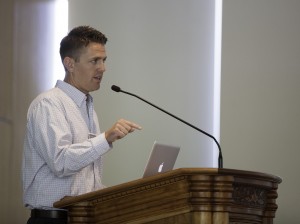Scott R. Braithwaite, a BYU assistant professor of psychology, walked Campus Education Week attendees through the process of choosing a spouse.

To answer the question of whether marriage really is the most important decision a person will ever make, Braithwaite referred to a number of quotations from general authorities of The Church of Jesus Christ of Latter-day Saints, including one from President Spencer W. Kimball.
“Marriage is perhaps the most vital of all the decisions and has the most far-reaching effects, for it has to do not only with immediate happiness, but also with eternal joys,” Kimball wrote in a March 1977 Ensign article. “It affects not only the two people involved, but also their families and particularly their children and their children’s children down through the many generations.”
The next question Braithwaite addressed was that of who decides whom one should marry. He first ruled out the existence of soulmates by referencing Elder Boyd K. Packer.
“While I am sure some young couples have some special guidance in getting together, I do not believe in predestined love. … You must do the choosing, rather than to seek for some one-and-only so-called soul mate, chosen for you by someone else and waiting for you,” Packer said. “You are to do the choosing. You must be wise beyond your years and humbly prayerful unless you choose amiss.”
Braithwaite then identified the pitfalls of basing a marriage on the belief of “soulmates.” One problem that may arise is that an individual may justify mistreating their spouse or ending their marriage when things get hard because the choice to marry them was not their own.
“We are active agents in this process. … I think there is something more romantic about this idea that you do the choosing, and there are some big implications also for how you go about this process and how you go about your marriage if you’re the one that does the choosing,” Braithwaite said.
He went on to address how to go about finding a spouse. As a basis for his answer, he referenced Doctrine and Covenants 9, in which Oliver Cowdery received an answer to his desire to translate the gold plates:
“Behold, you have not understood; you have supposed that I would give it unto you, when you took no thought save it was to ask me. But, behold, I say unto you, that you must study it out in your mind; then you must ask me if it be right, and if it is right I will cause that your bosom shall burn within you; therefore, you shall feel that it is right.”
Part of this study includes dating, according to Braithwaite, who advised people to date often and widely. Dating increases the ability to see problems and see if they’re reconcilable. It also allows for one to identify qualities they may not have previously known they desired in a partner. Braithwaite also cautioned to date with eyes wide open to see if the suitor’s dating behavior will persist into a marriage.
“Be willing to pay the price to know the soul of the person you’re wanting to marry,” Braithwaite said.




